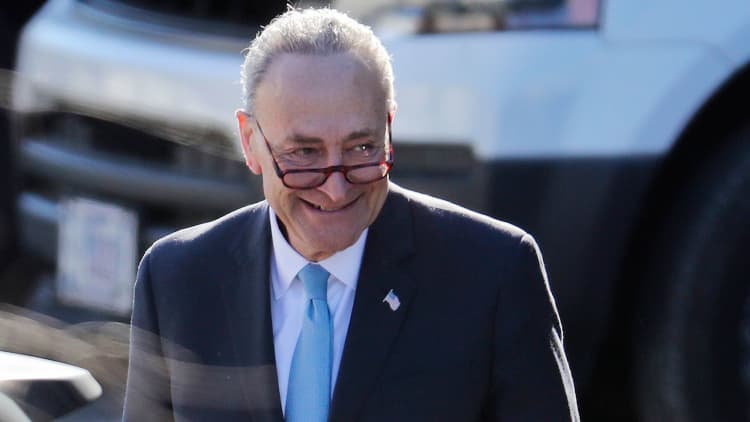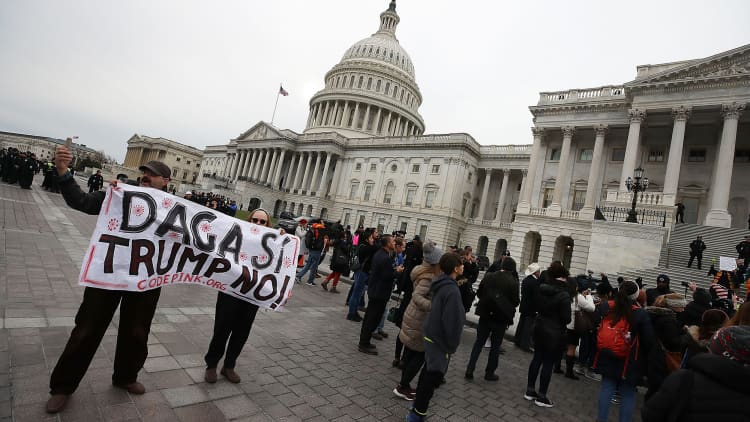
The deadline for a government shutdown closed in Friday night, and the Senate appeared far from a solution with only hours to spare.
Congress scrambled to reach an agreement before midnight Friday, when some government agencies will run out of money. A rush to break an impasse in the Senate appeared to yield little progress, even after Senate Minority Leader Chuck Schumer met with President Donald Trump at the White House in hopes of striking a deal.
Still, the Senate plans to vote at 10 p.m., ET, to end debate on a stopgap spending plan already passed by the House. If nearly all of the minority Democrats, and a few Republicans, oppose the legislation as threatened, it will all but assure that Congress will fail to pass a funding bill before the deadline.
Democrats and some Republicans have threatened to vote against a short-term deal, criticizing the continued use of stopgap bills rather than funding the government through more long-term, stable mechanisms. The minority party has also shown frustration about progress on talks toward a bipartisan immigration bill, which Democrats wanted to pass this week to protect hundreds of thousands of young undocumented immigrants from deportation.
The parties also remain divided over long-term defense and non-defense spending levels.
GOP leaders showed little optimism about a breakthrough hours before a shutdown would start. Republicans, who hold the White House, House and Senate, have put the burden on Senate Democrats to avert a shutdown.
Trump tweeted that the situation was "not looking good" for the military or border security at about 9:30 p.m. ET, two and a half hours before the deadline. He claimed that Democrats wanted to shut down the government to cover up what he called the "great success" of the Republican-passed tax law.
GOP leaders in Congress also were also hesitant about progress.
"There's no deal," Senate Majority Whip John Cornyn, R-Texas, said shortly before the planned vote, according to NBC News.
A deal was still possible before the midnight deadline, White House legislative affairs director Marc Short told reporters after 8 p.m., ET. Talks were ongoing at the highest levels of Senate leadership, but a deal on immigration seemed unlikely Friday, he added.
Hours before the deadline, Trump said he had an "excellent preliminary meeting" with Schumer. While both the president and senator cited progress, neither of them said they reached any kind of agreement.
Only four people were in the meeting: Schumer, Trump, White House chief of staff John Kelly and Schumer's chief of staff, a White House official told CNBC. Senate Majority Leader Mitch McConnell, R-Ky., and House Speaker Paul Ryan, R-Wis., did not attend.
Kelly spoke with Ryan and McConnell in separate calls after the meeting, a White House official told NBC News. The chief of staff kept both Republican leaders in the loop, the person said. A Republican aide told CNBC that the president and Ryan spoke later that afternoon.
"We had a long and detailed meeting," Schumer told reporters at the Capitol after the meeting. "We discussed all of the major outstanding issues. We made some progress, but we still have a good number of disagreements. The discussions will continue."
The White House showed some optimism about an agreement, at least by Saturday, which would limit the damage of a shutdown. In an interview with CNN, Office of Management and Budget Director Mick Mulvaney said he believes a funding deal will be reached within the next 24 hours.
When Schumer returned to the Capitol, he met with House Minority Leader Nancy Pelosi, D-Calif., and Senate Minority Whip Dick Durbin, D-Ill. Leaving the meeting, Durbin told reporters it was "too early to tell" if Congress could avoid a shutdown.
On Thursday night, the House, with nearly all Republican votes, passed a measure that would fund the government through Feb. 16. It would also reauthorize the popular Children's Health Insurance Program — an addition meant to get Democrats on board — and delay some Affordable Care Act taxes.
That bill's prospects looked dimmed in the Senate's planned Friday night vote.
However, some cracks began to show in the Democratic opposition on Friday. Democratic Sens. Joe Donnelly of Indiana, Joe Manchin of West Virginia, and Heidi Heitkamp of North Dakota, all of whom face re-election this year in states Trump won in 2016, said they would vote to keep the government open. Newly elected Doug Jones of Alabama also said he will back the measure.
Democrats were holding a caucus meeting at 8:30 p.m., ET, on Friday, according to NBC News.
Schumer has pushed for a shorter-term funding extension of only a few days to give lawmakers more time to strike a deal on bipartisan immigration legislation, which Democrats wanted to see passed this week. McConnell shot down the notion of approving funding for that length of time.
"These incredibly short-term extensions would not even give us enough time to actually write the legislation the Democratic leader is demanding," McConnell said Friday. "One extremely short term CR (continuing resolution) would lead to another and another."
Cornyn on Friday also called the idea of a dayslong resolution "absurd."
The White House also said it would oppose a funding bill of only a few days.
An earlier White House briefing in which officials put pressure on Senate Democrats to back the House-passed plan was delayed when Trump, Mulvaney and White House director of legislative affairs Marc Short got on the phone with Schumer to continue negotiations, a White House official told CNBC. Trump invited Schumer during that call.
A spending bill would need 60 votes to pass the Senate, which means 10 or more Democrats would have to support it. Since at least three Republicans and many more Democrats announced they would vote against the House-passed plan, its chance of clearing the Senate looked dim entering Friday.
WATCH: This is what happens when the U.S. government shuts down




